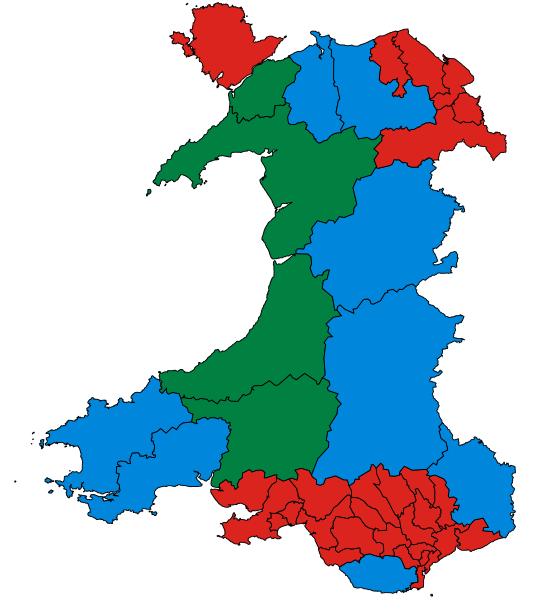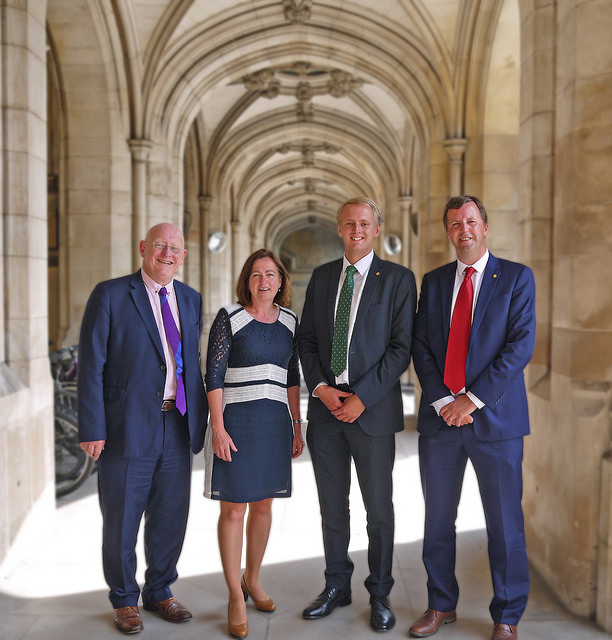Plaid Cymru: An Alternative to Punch and Judy Politics 26.06.17

In the first of a series of Planet Extra articles giving an in-depth reflection on the
2017 General Election from different party-political perspectives, Sioned Williams draws
on her experience of campaigning for Plaid Cymru. She details the challenges faced by Plaid in June, due to the assertion of an increasingly ‘gladiatorial’ two-party politics, and the alternative Plaid offers should Labour fail to stand up for the Welsh economy as the UK leaves the EU.

Wales Parliamentary Constituency 2017 Results © Brythones.
This wasn’t a snap election for my family. As I was a Plaid Cymru candidate in the local elections standing in a solidly Labour ward, the canvassing and campaigning had been a feature of our lives since before Christmas. So when my husband Daniel decided to put his name forward to be the Plaid Cymru Westminster candidate for our constituency, Neath, the leaflet-writing, door- knocking, public meetings, photo-opportunities and press releases that followed felt more like an intense climax to a long-fought battle rather than a new assault on political opponents. In the first few weeks the similarity between the two elections campaigns continued, in terms of the apparent crumbling of blind Labour support and also an ability to engage voters on local issues, such as the neglect and decline of their area, which many agreed was the result of the stagnation and tiredness of a party too long in power.
The major story of the campaign for many Plaid Cymru activists was the Big Change: the Tory tsunami that was predicted to hit us by poll after poll started to feel less real as the ineffectiveness of Theresa May’s campaign unfolded before us. Fed by a broadcast media that gave more air time to Caroline Lucas than Leanne Wood, and a print media that painted the campaign in terms of a Punch and Judy show, the dominance of two-party politics was spectacularly reasserted. This has been reflected in the findings of a post-election study by Loughborough University which found that 84 per cent of the featured politicians in the news during the election period were from the Labour or Conservative parties. No wonder then that smaller parties were squeezed so hard in Wales.
The most disappointing element of the result for someone who campaigned for one of the many energetic and committed first-time candidates fielded by Plaid Cymru in this election, was the gradual loss of focus on local issues and concerns. Following on from a fairly successful local election for Plaid, this was even more evident than is usual in a Westminster campaign. On the doorstep and on social media, people would agree with valid criticism of Labour’s record in areas such as Neath and Llanelli, but inspired by an underdog’s principled stand against a non-debating, U-turning, and increasingly ridiculous Maybot, declared that although they liked Plaid Cymru’s policies, they were voting ‘for Corbyn’. In a pick-a-side election it got harder and harder to define the alternative that Plaid Cymru were offering, and although the welcome on the door to the party’s strong candidates and sound vision for Wales remained warm until the end, this didn’t translate into support at the ballot box. As a community activist, I was deeply concerned that the opportunity an election provides to draw attention to the issues which affect the everyday lives of the people, was lost in a polarised, gladiatorial fight to the death — or as it turned out, an even more damaging limbo. The resulting increased majority for many Welsh Labour MPs such as my own, in spite of their widely acknowledged unpopularity and lack of dynamism in the constituencies they represent, caused me genuine sadness, while the high number of votes passed on to the Tories’ ‘paper candidates’ by UKIPers and Brexiteers was equally frustrating for someone who believes that votes should be worked for and earned.
The post-election dawn brought with it some welcome rays of light. It was another ‘by the skin of our teeth’ election for Plaid Cymru and although the lack of significant progress over a series of elections is a cause for concern, the fact that Plaid policies found their way into both Labour and Conservative manifestos shines a light on the influence we undeniably wield on public debate, from zero hours contracts, to free tuition for students, to scrapping tolls on the Severn Bridge to a new Welsh National Bank Holiday! The search now should not be for a new leader, but for a way to better distinguish ourselves from the devolution-friendly stance which is projected, if not always enacted, by Labour and Tories alike. Nationally, the unique rhythm and arithmetic of Ceredigion politics gave us a reason to celebrate, with the election of Ben Lake, as well as did holding on to all our MPs. Doing so, in such a two-way fight, was testament to the industrious record and huge local appreciation of Jonathan Edwards, Liz Saville Roberts and Hywel Williams.
Locally, energetic, positive campaigns in the Rhondda and Llanelli, and in my own constituency Neath, have attracted a new generation of activists to the vision and service of the party and in some cases even won over local figures from other parties, equally disillusioned following the sacrifice of representational politics on the altar of presidential, politics, including the well-respected former Labour Neath councillor, Andrew Jenkins and Ian Thomas, who stood as an independent against Plaid Cymru in the council elections. Although I, like so many others in my party, would have dearly loved to have seen the formation of a progressive alliance, rather than a ‘dead woman walking’ in Number Ten, hand in hand with a nightmare-ish band of extreme Unionists, there is hope that this severely weakened government may well be forced to soften its catastrophic hard Brexit position. Securing access to the single market, and protecting thousands of Welsh jobs is the only campaign in town now. If the Labour MPs who promised to speak ‘for the many’ and stand up ‘for Wales’ fail to find a way of bringing pressure to bear on this carrion of a government to safeguard our economy, then Plaid Cymru should have all the ammunition it needs come next polling day.
If you appreciated this article, you can read longer articles on a wide range of topics in Planet magazine, and you can buy Planet here.
About the author
Sioned Williams was brought up in the valleys of Gwent, but has made her home in Alltwen in the Swansea Valley. A former journalist and producer with BBC Wales, she is now Communications and Development Manager at Academi Hywel Teifi, Swansea University and co-manages Tŷ’r Gwrhyd, the Welsh Centre for the Swansea and Neath Valleys. She writes and broadcasts as a reviewer and commentator and is a Plaid Cymru Community Councillor.
If you liked this you may also like:
Culture and Nation after the Referendum
Leanne Wood on why Plaid Cymru has secured more support for culture after the EU referendum, and how the party’s influence has created a stronger voice on ‘Brexit’ in the Assembly.
Arresting UKIPia
Huw Williams looks for a path toward a political maturity in Wales after the EU referendum exposed a lack of faith and direction.
Our readers respond to half a century of Planet!
This year, as the pandemic necessitated Planet’s 50th birthday party to be postponed until regulations are lifted, we invited our readers to send in their stories and anecdotes about the magazine. We thank everyone who replied for sharing their thoughts, and hope to welcome readers near and far to a celebratory event before too long…

